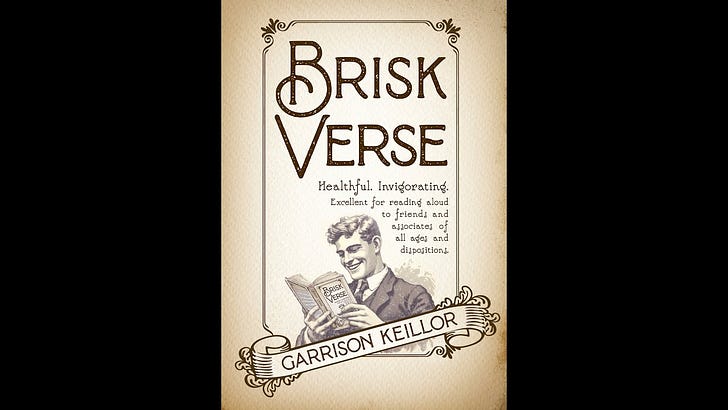We asked for your renditions of poems from Garrison’s book Brisk Verse, and a number of you rose to the challenge. Reading poetry aloud has become a neglected art and overlooked form of entertainment. But this new book offers the perfect opportunity to bring it back.
After putting out the call, we received a variety of presentations, which ranged from silly to serious, from simple readings to full-blown performance pieces.
Wouldn’t it be fun to look through your poetry collections and host a poetry reading party?
PURCHASE BRISK VERSE - CLICK HERE
Review of BRISK VERSE from Publishers Weekly’s BookLife
Sly, spry, and often touching, Keillor’s 31st book mounts a spirited revival of the art of light verse, as the bard of Lake Wobegon offers poems stripped of pretension but still sharply crafted, alive with feeling, and forever waltzing with readers’ anticipation of the next rhyme. One choice couplet, from a selection concerning light verse itself: “This fatuous talentless ignorant poet. / Oh, for some fresh horse manure—I’d throw it.” Manure chuckers won’t find many targets here, though, as Keillor is in fine form throughout, heeding the advice laid out in the title poem, guidance targeted to entertainers but also broadly applicable: “Brevity is the soul of wit. / Go out there, get ahead, then quit.”
Keillor’s signature mode remains the understatedly comic, and the Lutheran humility he has long lampooned, celebrated, and exemplified powers the collection, both as a subject and the lens through which he sees the world. “Our pastor is not that bad,” one narrator notes, a line that cuts to the quick of a sturdy strain of the American grain. Piquant wit even powers poems about life as an octogenarian, including one daydreaming about the ease of assisted living (“Three thousand a week and they treat us quite well”), though it never undercuts the resonance of Keillor’s elegies and encomiums on a host of worthy subjects: Norma Jean, soon to be known as Marilyn Monroe; medical workers; a grandson; an old cat; great writers; a cougher during a Haydn performance; a warm recasting of Larkin’s most famous line; and the sacrifice of American soldiers, whose youth still astounds the poet.
Highlights abound in this unpredictable collection, including limericks dedicated to authors Keillor loves (“Dear Emily D. of Amherst / Seldom shouted or cursed”); ironic stories of love, death, technological upheaval, and being dumped for voting Trump; and a laugh-out-loud appraisal of Kansas. The lowlights are mild provocations—a poem called “Flatulence”; another imagining incarceration for glancing at women—that at least live up to the title. They’re brisk.
Takeaway: Spirited, sparkling light verse in an understated American grain.
Comparable Titles: John Hollander’s ; William Harmon’s The Oxford Book of American Light Verse.




